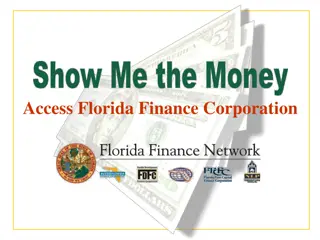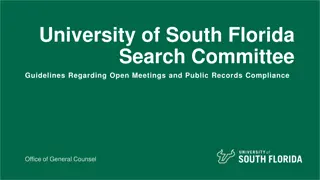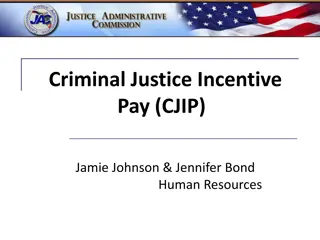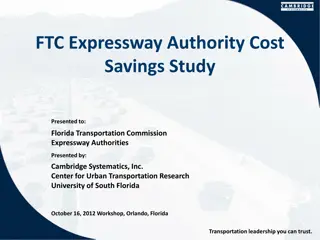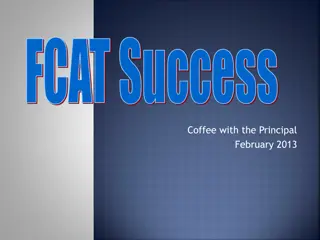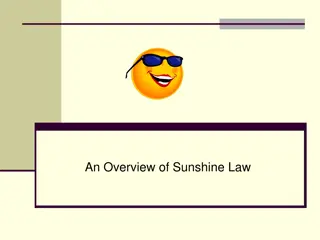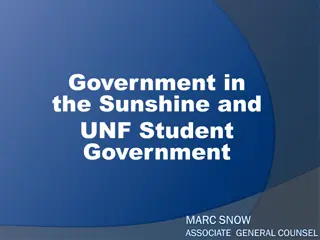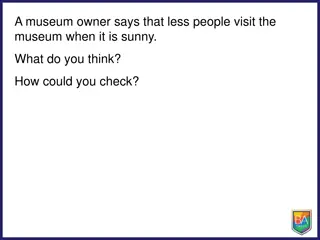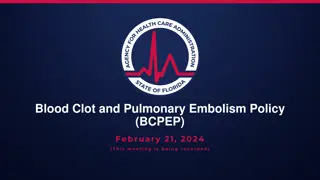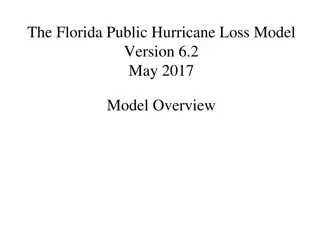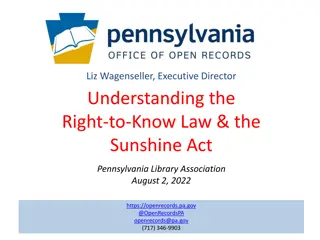Understanding Florida's Sunshine Law
The Sunshine Law in Florida mandates that meetings of collegial bodies be open to the public, with reasonable notice given and minutes kept. Discussions between body members must occur in public meetings, not via private communication. Third-party involvement should not serve as a means to circumvent transparency requirements. Proper notice for public meetings, hearings, and workshops is vital, as outlined in Florida Administrative Register guidelines.
Download Presentation

Please find below an Image/Link to download the presentation.
The content on the website is provided AS IS for your information and personal use only. It may not be sold, licensed, or shared on other websites without obtaining consent from the author. Download presentation by click this link. If you encounter any issues during the download, it is possible that the publisher has removed the file from their server.
E N D
Presentation Transcript
COMPLIANCE WITH SUNSHINE LAW
Sunshine Law The Sunshine Law is established by Article I, Section 24 of the Florida State Constitution and Chapter 286, Florida Statutes.
SUNSHINE LAW A collegial body is subject to the Sunshine Law. Any gathering (this includes email communications) of two or more members of the collegial body to discuss some matter on which foreseeable action will be taken by the collegial body is considered a meeting subject to Sunshine Law requirements.
Collegial Body Examples: Commission or council Advisory board Ad hoc committee Task force
Basic Requirements The Sunshine Law imposes three basic requirements: 1. Meetings of the collegial body must be open to the public 2. The collegial body must give reasonable notice of its meetings 3. The collegial body must keep minutes of its meetings
MEETINGS A meeting of a body subject to the Sunshine Law is broadly defined to include any gathering formal or informal during which two or more members of the body discuss the official business of the body. Accordingly, business-related discussions between members of the collegial body may only take place at open, properly-noticed meetings. Members may not discuss the business of the collegial body with each other through private phone conversations or e-mail discussions. Members may distribute documents to each other, but they may not discuss or exchange comments on those documents outside of a public meeting.
MEETINGS In addition, members may discuss business with third parties (i.e., non- members of the body), provided the members do not use a third party as a liaison for business-related communication with other members.
NOTICE Reasonable notice of public meetings is required. AHCA follows Section 120.525, Fla. Stat. in providing public meeting notice, which dictates the following:
NOTICE Notice of public meetings, hearings, and workshops shall be by publication in the Florida Administrative Register not less than 7 days before the event. The notice shall include a statement of the general subject matter to be considered.
NOTICE An agenda shall be prepared in time to ensure that a copy of the agenda may be received at least 7 days before the event by any person in the state who requests a copy and who pays the reasonable cost of the copy. The agenda shall contain the items to be considered in order of presentation. After the agenda has been made available, a change shall be made only for good cause, as determined by the person designated to preside, and stated in the record. Notification of such change shall be at the earliest practicable time.
MINUTES Although the Sunshine Law requires the collegial body to record minutes of its meetings, such minutes need not be verbatim transcripts of the proceedings. A summary or notes of the meeting is sufficient. It is within the collegial body s discretion to determine who is responsible for creating the minutes of meetings.
SUNSHINE LAW AND PUBLIC RECORDS As a general matter, any documents or other materials that are (1) created or received by collegial body members, (2) related to the collegial body s official business are public records which must be made available to the public for inspection and copying.
EXAMPLES OF PUBLIC RECORDS These are all considered public records if they are used to perpetuate, communicate, or formalize knowledge. Reports circulated drafts of such reports Business related correspondence between collegial body members and AHCA, or any member of the public E-mail between collegial body members and AHCA, or any member of the public Personal notes of collegial body members
CONFIDENTIAL INFORMATION It is possible that records created by the collegial body will include information that is considered confidential and exempt from the Public Records Law. For example, some information which could conceivably come before the collegial body, such as Medicaid recipient identifying information and medical records, is confidential and exempt. In the event that a collegial body document were to include confidential information, the relevant portions of that document would have to be redacted before the document could be released to the public. Collegial body members should also take care during the public meetings not to discuss information derived from such confidential records.
Public participation S. 286.0114, Fla. Stat. requires that members of the public be given reasonable opportunity to be heard on a proposition that is before the Council. The opportunity to be heard does not apply to acts which are ministerial, for example, the approval of minutes.
Public participation The Workgroup may develop guidelines for public participation such as providing time limits for speakers, having a single representative speak for a group, using speakers cards, or designating a specific time period for public comment.
Penalties Knowing violations of the Sunshine Law are second degree misdemeanors, which carry a maximum sentence of 60 days and up to a $500 fine. Public officers who violate the law have committed a non-criminal infraction, punishable by a fine of up to $500.


